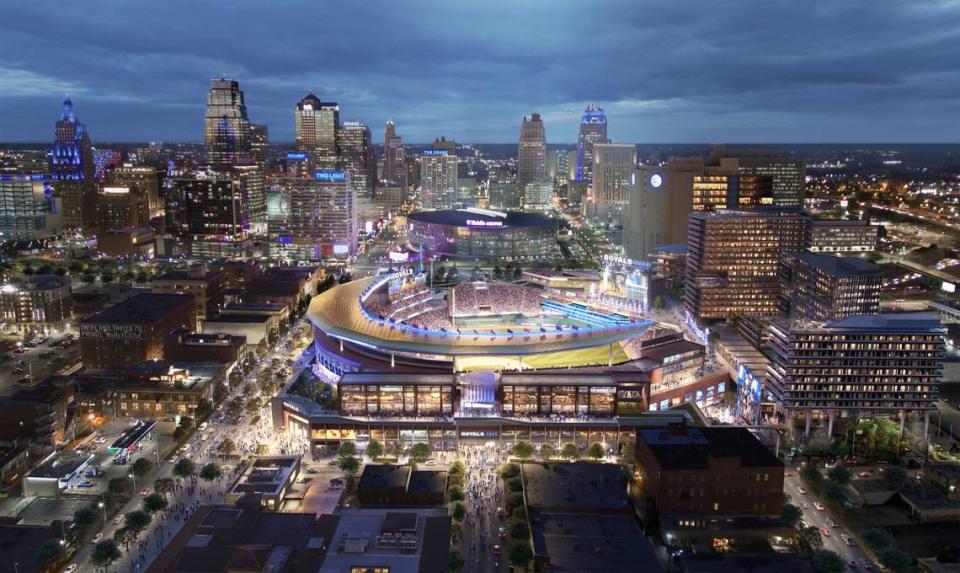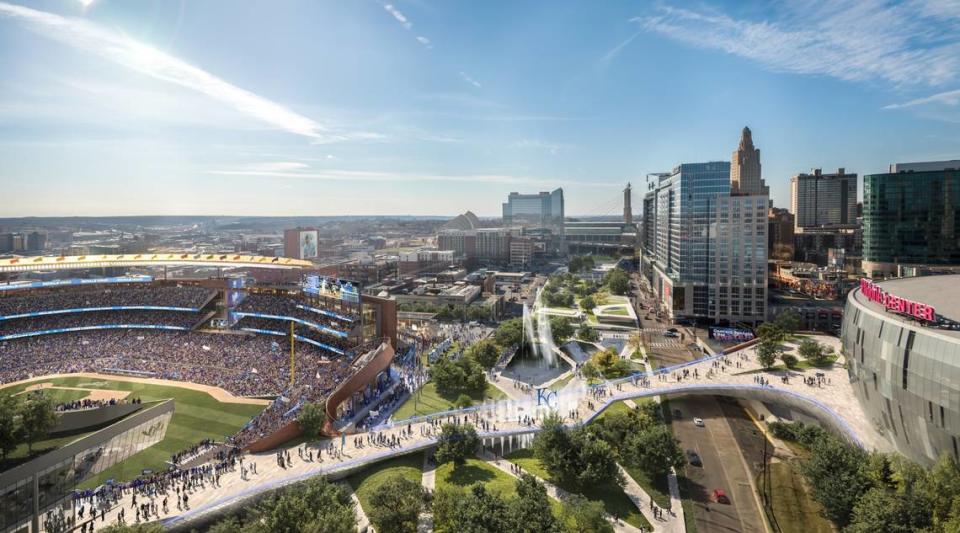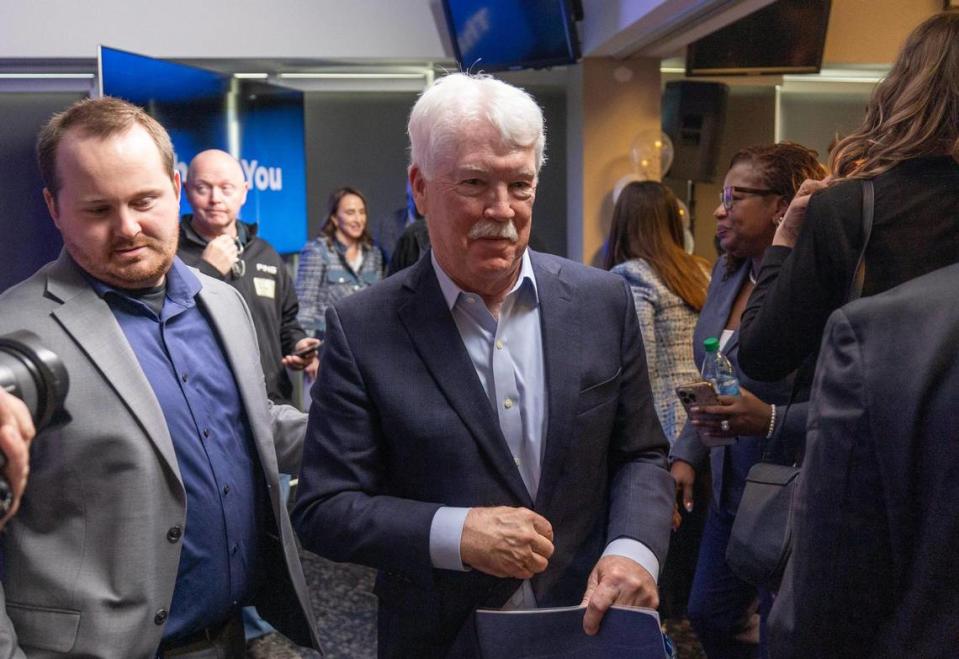Royals now face organized opposition to sales tax that would pay for downtown ballpark
Opponents of a tax to subsidize construction of a new downtown Kansas City baseball stadium have formally created a campaign committee, vowing to beat the Royals and stadium supporters at the polls on April 2.
“It doesn’t matter how much money they spend, the overwhelming majority of people in Jackson County are opposed to this,” said Tim Smith, campaign manager for the Committee Against New Royals Stadium Taxes. “We just need to inform voters when the election is and get the people out to vote.”
Chairing the committee is Becky Nace, a former Kansas City Council member who ran unsuccessfully for mayor in 2007. Nace has for months been active on the Facebook group page Save Kauffman (Royals) Stadium at Truman Sports Complex, where she has been urging the group’s 8,400 member to vote against the sales tax that would help pay for a $1 billion-plus Royals ballpark and renovations to Arrowhead Stadium for the Chiefs.
The committee filed paperwork with the Missouri Ethics Commission this week, which allows it to accept donations and spend money on campaign activities. Smith said a grassroots fundraising campaign will be kicking off as soon as its website is up at the domain name reserved for it: alltaxedout.com.
So far the committee has little to no money in its bank account, Smith said. The Royals recently contributed $500,000 to initially fund the pro-tax campaign committee the team formed called The Committee to Keep the Chiefs and Royals in Jackson County.
Its first public financial report is due Thursday and could give a hint as to how that money is being spent. Former Kansas City Mayor Sly James said his firm is among those that have been hired.
In a news release on Tuesday, the opposition committee said it represents a diverse coalition of sports fans, business owners, the working poor and other concerned taxpayers that “vehemently opposes the proposed new sales tax aimed at constructing a new Royals stadium in downtown Kansas City, Missouri.”
If approved, the April 2 ballot measure would authorize a new 3/8th-cent sales for 40 years to subsidize construction costs for a ballpark in the East Crossroads district of greater downtown Kansas City, as well as so-far-unspecified improvements at Arrowhead.
The tax would also provide both teams with a stream of revenue for stadium upkeep and operations and pay off the remaining debt that voters authorized in 2006 for renovations at Kauffman and Arrowhead. That debt is now being paid with proceeds from the current 3/8-cent stadiums tax, which is set to expire in 2031 but would end and be replaced by the new tax, if approved.
According to the Royals, taxpayers would provide $600 million to $700 million in new borrowings up front for the construction projects, with the teams and other sources, yet to be specified, paying for the rest of the costs. No firm numbers have been settled on as lease agreements between the county and the teams remain unresolved.
But with interest, taxpayers will pay far more than that over the course of those 40 years, which is one of the points that the opposition group plans to highlight in its campaign.
“People who have already been taxed too much and want relief,” Nace said in a prepared statement. “This new sales tax has been sold as an economic benefit for all residents, but what it really does is transfer public wealth to private interests to the tune of $2 billion dollars. If billionaires want new things they should have the decency to pay for them.”
The committee plans to hold a news conference Wednesday afternoon at the Truman Sports Complex to announce further details of its campaign.
‘That is a lie’
The committee’s announcement came a day after the citywide renters union, KC Tenants, announced its opposition to the ballot measure.
Smith runs the political consulting firm D. Smith Consulting LLC and was one of the organizers of the successful Save the Paseo ballot initiative in 2019. By an overwhelming margin, voters restored the historical name of that Kansas City boulevard after the City Council had renamed it after the fallen civil rights leader the Rev. Martin Luther King Jr. The city later named another stretch of roadway in King’s honor.
In a phone interview Tuesday, Smith said the Royals have been dishonest and less than transparent in their pursuit of taxpayer support for a new stadium. He said the teams are wrong to tell voters that they are being asked to extend the existing tax.
“That is a lie,” he said. “It’s right there in the Question 1 ballot language. This is a repeal of what people have been paying. And it’s going to be replaced with a new tax. The new tax will be a 3/8th- cent sales tax, sure. But the terms of the agreement will double in the amount that taxpayers will pay over the course of the time.”
He also said he suspects that the Royals and Kansas City Mayor Quinton Lucas are deliberately avoiding discussing what will happen should the tax pass and some property owners at the site of the proposed new stadium refuse to sell their buildings and land.
Lucas has been promoting the economic benefits of the stadium in his public statements, Smith said.
“What he has not been honest to say is that he’s prepared to use eminent domain for these property owners who refuse to sell,” he said. “I haven’t heard the mayor mention that not one time, and we know that that is the go-to if this passes, in order to get those owners out of the way.”
Crossroads residents and business owners were set to meet privately Tuesday evening to discuss their views on the project.
The Royals said last week that they are negotiating to purchase properties in the six-block area planned for a new stadium, but deflected when reporters asked what would happen if some property owners refused to sell. The team plans to buy those 17 to 18 acres and convey to the county that portion of that land on which the county-owned stadium would sit.





